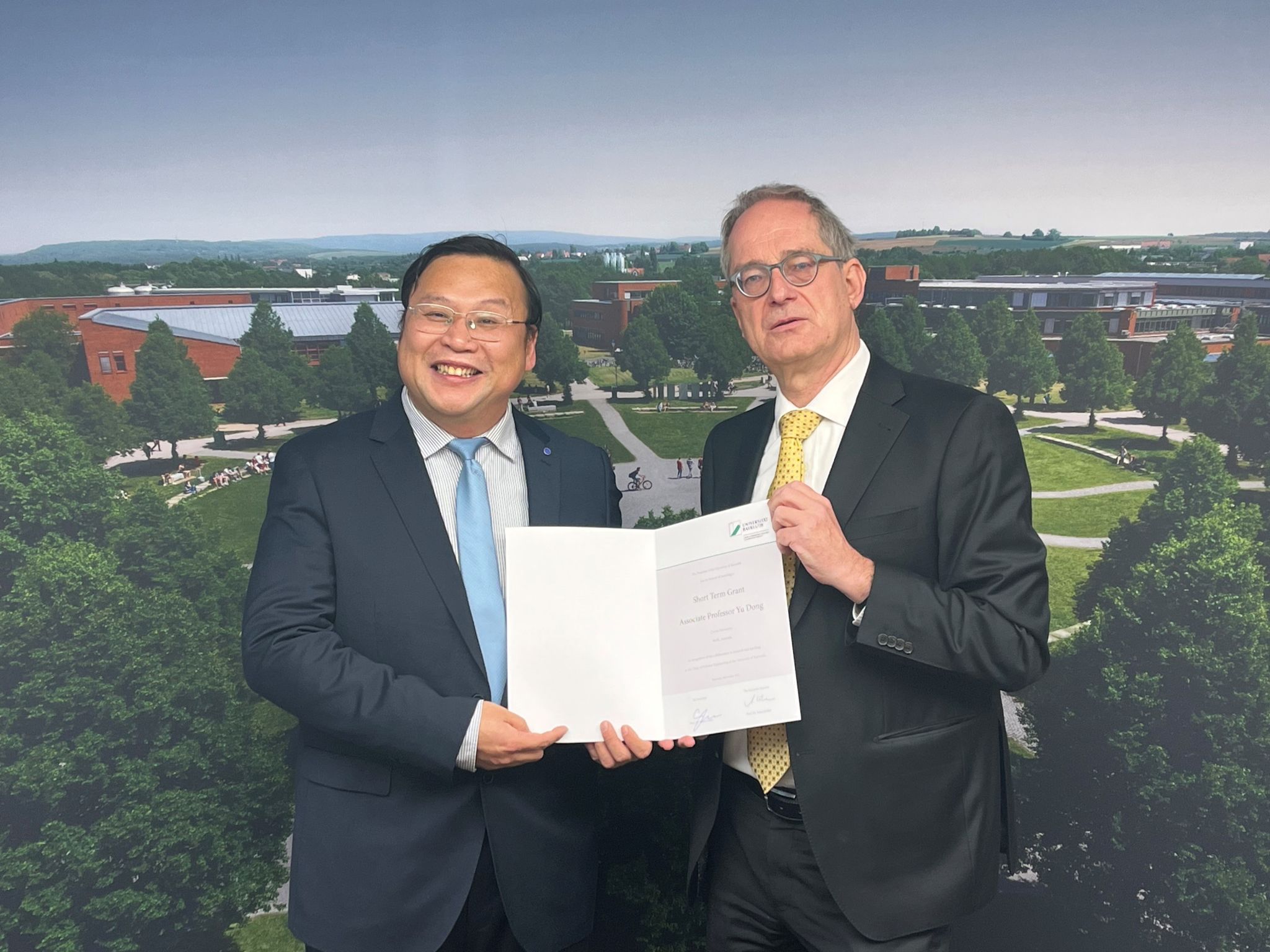Meet the Grantee: Associate Professor Yu Dong
Optimisation of PLA Reinforced Composites for Enhancing Thermal/Electrical Conductivities and Processability Using Machine Learning Approach
Initially, Will Smith pushed our Short Term Grantee Associate Professor Yu Dong (Curtin University, Australia) to optimize the use of Artificial Intelligence. After his stay at the Chair of Polymer Materials led by Professor Ruckdäschel, Dr. Dong has thrilling plans regarding the collaboration between the two universities.

Associate Professor Yu Dong and Prof. Dr. Stefan Leible, President of the University of Bayreuth
If you had to explain the research project of your Short Term Grant to the person you metin the elevator, how would you describe it?
Yu Dong: This research project aims to develop a robust machine learning model using artificial intelligence (AI) to identify optimal processing parameters and material formulation in melt compounding of polylactic acid (PLA) composites reinforced with boron nitride and (or) carbon black in order to enhance their thermal/electrical conductivity and processibility.
Was there a special moment in your life that made you decide for your research focus?
YD: A special moment was that when I watched Will Smith's popular AI movie "I, Robot" (2004), I realised that AI (not limited to robotics) may be able to use in manufacturing advanced composite materials in a more sophisticated and intelligent way towards Industry 4.0, especially benefiting the identification of a robust processing-structure-property as the key to produce multifunctional composite materials.
What is in your opinion the future of your field? In what way can research in your fieldcontribute to meeting the urgent challenges of our time?
YD: The future of composite materials will be a combination of AI technology for advanced and intelligent manufacturing of composite materials, and additive manufacturing to meet the urgent challenge of significantly increasing manufacturing and processing costs, very complicated design structures/products and the versatility of end-user products with multifunctionalities in highly optimal and well-tailored material properties and characteristics.
What does international research mobility in today's world mean to you?
YD: International research mobility means great opportunities to learn from eminent research leaders from other universities with excellent interactions and brain storms to collectively generate brilliant ideas and put forward the research action to achieve the ultimate goals for a win-win research outcome.
What was your personal experience during your stay?
YD: My stay at the University was very positive, especially making so many friends within the host research group. It indeed made me feel very welcome being part of the team. The best aspect about the University and city of Bayreuth as a whole would be a very cognitive learning and friendly environment for teaching and research. I can feel the knowledge transfer and spark at every corner. My favourite spot in the region is Neue Materialien Bayreuth GmbH, which clearly demonstrates an outstanding research expertise and very close industrial linkage with German automobile/aerospace industries with great endeavours made by my host Professor Holger Ruckdäschel at the Department of Polymer Engineering.
What were your expectations when you applied for the Grant?
Did you have specific goals in mind, something you were hoping to achieve?
YD: My expectations were not only to focus on my research project in composite materials, but also on a wider scale a genuine research collaboration between Curtin University and Bayreuth University in the field of polymers and composite materials. The specific goal in my mind is to foster a long-term research exchange/visit program between these two great universities for knowledge share/transfer in order to strengthen the Germany-Australia bilateral research in advanced materials and manufacturing technologies.
If you could choose a famous researcher or scientist to have dinner with, who would it be?
YD: I would like to choose Professor Seeram Ramakrishan from National University of Singapore, who has a truly international leading status in advanced material manufacturing, nano/biotechnologies, material circular economy and plastic recycling.
Have you noticed any differences or similarities between UBT and your home university?
YD:The similarities of UBT and my home university are truly open and internationally well recognised as the knowledge hubs to educate the young generation of both countries despite UBT's more industrial oriented research focus.
The Grantee
My expectations were not only to focus on my research project in composite materials, but also on a wider scale a genuine research collaboration between Curtin University and Bayreuth University in the field of polymers and composite materials. The specific goal in my mind is to foster a long-term research exchange/visit program between these two great universities for knowledge share/transfer in order to strengthen the Germany-Australia bilateral research in advanced materials and manufacturing technologies.
